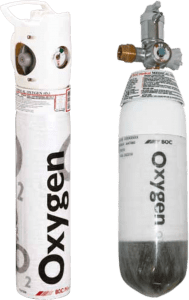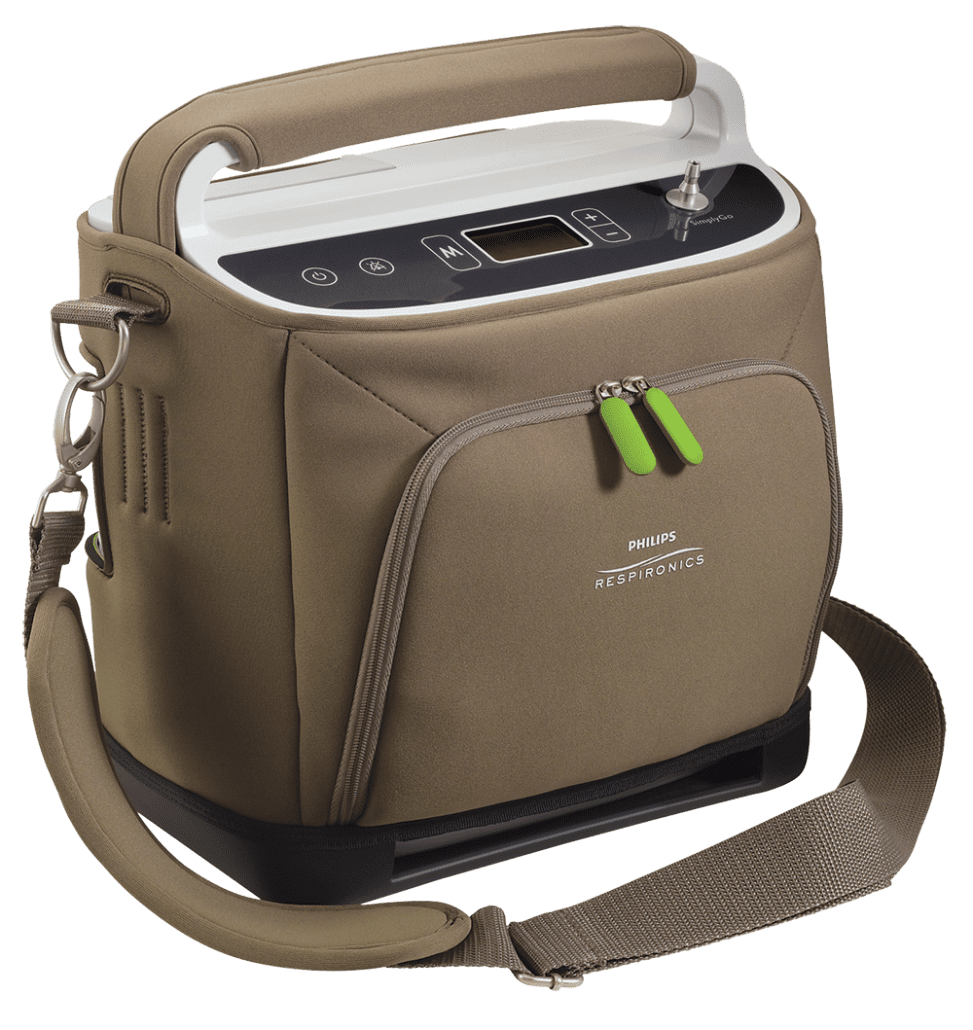Portable oxygen
Some people may have an oxygen level which is normal at rest, but falls on exertion. If you are in this position, use of supplemental oxygen may significantly increase the distance you are able to walk. Portable oxygen may be used either from a small portable cylinder or from a portable oxygen concentrator.
Portable oxygen cylinders typically last for 1-2 hours depending upon the flow-rate used and are available on the NHS.
Portable oxygen concentrators are light enough to carry around in a small rucsac or a highly portable trolley. Concentrators provide a constant stream of oxygen by enriching room air, so never run out of gas, unlike portable cylinders. Portable concentrators run on battery power and provide up to 6 hours of oxygen or more without re-charging, or all day if you are able to re-charge.
Portable oxygen concentrators have revolutionised the lives of many people with respiratory impairment, allowing them to travel the world including cruises even trips to altitude.
If your oxygen levels are found to fall during exercise, it may be helpful to perform a walking test whilst you are using oxygen supplementation. If oxygen supplementation improves your walking distance or breathing, we can assist you to purchase a concentrator from a supplier, as a medical certificate is required. Alternatively, if you meet the NHS criteria and you prefer to have a portable oxygen cylinder, we can prescribe this on the NHS.
Long term home oxygen
Typically, people benefit from long term oxygen therapy if their oxygen saturation at rest is persistently below around 88%. If you have an oxygen level which is in this region, even when you are at rest, then we would perform a blood test for a more accurate measurement. If a low resting oxygen level is confirmed, you would benefit from continuous oxygen therapy at home, which is available on the NHS. Use of long term home oxygen extends the life expectancy of those with low oxygen levels. You will also benefit from portable oxygen for use when you go out.

Portable oxygen cylinders

Portable oxygen concentrator
Treatment options are summarised in the table below.
We have no affiliation to any particular manufacturer and will suggest the most proven equipment which is most suitable for your individual needs. Factors which determine preference include battery life, maximum oxygen output, weight and suitability for use at altitude.
| Oxygen modality | Suitable for | Pro | Con |
| Portable oxygen cylinder | Suitable for those whose oxygen level is low at on exercise and / or at rest. | Available on the NHS. | Limited capacity of 1-2 hours. Not suitable for 24-hour per day usage. |
| Portable oxygen concentrator | Suitable for those whose oxygen level is low at on exercise and / or at rest. | Much greater reserve eg 6 hours or more before recharging. Higher flow-rate possible, better for those with lower oxygen blood level eg fibrosis. Some models usable at high altitude. | Not available on the NHS. |
| Home oxygen concentrator | Suitable for those with a low resting oxygen level | Available on the NHS. | Not portable. |
General Respiratory assessment
If requested, Dr Dakin can also make a full assessment of your underlying lung condition. This may include measurement of full lung function, review of your previous xrays and a treatment recommendation. A referral is needed from your GP for full Respiratory assessment.
In addition to the usual medical therapies, some people with COPD may benefit from a lung volume volume reduction procedure. See section on COPD.
If you would like to know more about oxygen therapy or anything else, please contact us for an appointment at which we can discuss all aspects of your respiratory health and the details of the programme. You can email info@guildfordrespiratory.co.ukor call on 01483 555800 ext 5297 or 07495 261 587.
Useful links
http://www.intermedical.co.uk/products/oxygen+therapy/portable+oxygen+concentrators
https://www.oxygenconcentratorstore.com
https://healthoxygen.com American website with prices in dollars but useful overview of a range of devices.
Long term home oxygen
Typically, people benefit from long term oxygen therapy if their oxygen saturation at rest is persistently below around 88%. If you have an oxygen level which is in this region, even when you are at rest, then we would perform a blood test for a more accurate measurement. If a low resting oxygen level is confirmed, you would benefit from continuous oxygen therapy at home, which is available on the NHS. Use of long term home oxygen extends the life expectancy of those with low oxygen levels. You will also benefit from portable oxygen for use when you go out.
Treatment options are summarised in the table below.
We have no affiliation to any particular manufacturer and will suggest the most proven equipment which is most suitable for your individual needs. Factors which determine preference include battery life, maximum oxygen output, weight and suitability for use at altitude.
| Oxygen modality | Suitable for | Pro | Con |
| Portable oxygen cylinder | Suitable for those whose oxygen level is low at on exercise and / or at rest. | Available on the NHS. | Limited capacity of 1-2 hours. Not suitable for 24-hour per day usage. |
| Portable oxygen concentrator | Suitable for those whose oxygen level is low at on exercise and / or at rest. | Much greater reserve eg 6 hours or more before recharging. Higher flow-rate possible, better for those with lower oxygen blood level eg fibrosis. Some models usable at high altitude. | Not available on the NHS. |
| Home oxygen concentrator | Suitable for those with a low resting oxygen level | Available on the NHS. | Not portable. |
General Respiratory assessment
If requested, Dr Dakin can also make a full assessment of your underlying lung condition. This may include measurement of full lung function, review of your previous xrays and a treatment recommendation. A referral is needed from your GP for full Respiratory assessment.
In addition to the usual medical therapies, some people with COPD may benefit from a lung volume volume reduction procedure. See section on COPD.
If you would like to know more about oxygen therapy or anything else, please contact us for an appointment at which we can discuss all aspects of your respiratory health and the details of the programme. You can email info@guildfordrespiratory.co.ukor call on 01483 555800 ext 5297 or 07495 261 587.
Useful links
http://www.intermedical.co.uk/products/oxygen+therapy/portable+oxygen+concentrators
https://www.oxygenconcentratorstore.com
https://healthoxygen.com American website with prices in dollars but useful overview of a range of devices.

